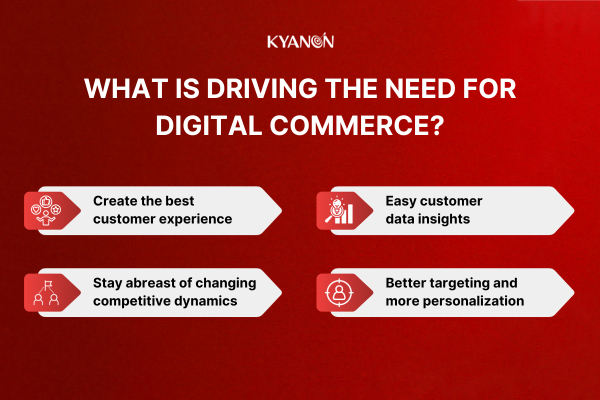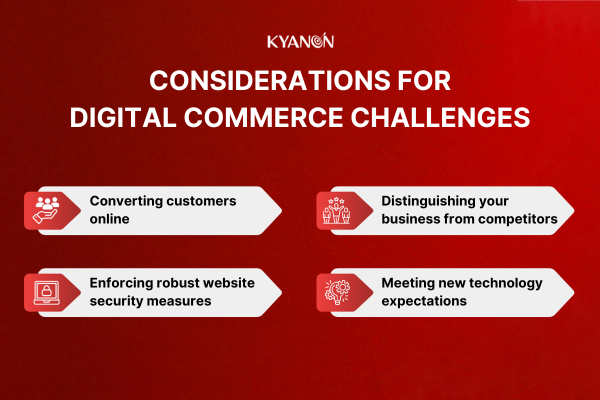Digital commerce has revolutionized the way businesses operate and how consumers shop. It has eliminated many of the barriers associated with traditional brick-and-mortar retail, allowing businesses to reach customers globally and operate 24/7.
In this blog, Kyanon Digital will walk you through what Digital Commerce is and how it works.
1. What is Digital Commerce?
According to Shopify – multinational e-commerce company, “Digital commerce is the buying and selling of goods and services conducted electronically over digital platforms. It includes online transactions, electronic payments, and digital marketing strategies to facilitate commercial activities. Digital commerce also includes various forms such as ecommerce including mobile commerce, social commerce, and more.”
2. How Digital Commerce works?
Digital commerce commences when a customer’s initial online interaction with a brand or product takes place. This initial encounter could occur through various avenues, such as spotting an advertisement in their social media feed, encountering the brand’s website in their Google search results, or perusing a product listing on a retail aggregator.
Take, for instance, a scenario where a customer is browsing Amazon, a prominent e-commerce platform. Amazon utilizes a sophisticated algorithm to customize search results for each individual, ensuring that the order in which items appear can significantly differ from one customer to another. This variability is contingent on numerous factors, including customer behavior history, geographic location, and various other variables.
Every transaction automatically contributes to the refinement of marketing strategies. Analytics play a pivotal role in enhancing the way products are promoted, displayed on the website, and in the management of customer support and inquiries.
In this context, Digital Commerce transcends the mere process of moving products from one point to another. It primarily revolves around the collection and strategic utilization of customer data to consistently enhance the online shopping experience.
3. What is Driving the Need for Digital Commerce?

3.1. Create the best customer experience
According to a Qualtrics study, over 65% of customers believe that a company’s app or website significantly influences their overall experience. These individuals consider the digital experience a crucial factor when it comes to recommending a brand.
Furthermore, people are increasingly relying on digital platforms for post-purchase support, including customer service. Additionally, the concept of omnichannel fulfillment is gaining prominence, and it has become an expectation for most consumers when interacting with brands today.
In recent years, this trend has evolved into an essential solution for businesses and retailers seeking to boost their sales with minimal effort. This approach streamlines various sales channels, encompassing online, mobile, in-store, kiosk, and call centers, while integrating inventory sources from stores, warehouses, suppliers, and marketplaces. It also offers diverse fulfillment options, such as home delivery, in-store pickup, or collection point pickup.
3.2. Stay abreast of changing competitive dynamics
If you’re not presently engaged in customer journey mapping, it’s highly advisable to initiate the process. It’s likely that your competitors have already integrated this into their digital commerce strategy.
When you concentrate on the key touchpoints in a customer’s journey that foster brand loyalty, you gain insights into what motivates a customer to advocate for your brand among their social circles. Analyzing customer data can streamline the challenge of outperforming your competitors in this regard.
3.3. Easy customer data insights
Digital commerce simplifies the collection and storage of customer data. You gain insights about them seamlessly as they browse or make purchases from your online store.
Even with digital commerce, you can monitor customer interactions and their buying frequency.
Every item that customers view and don’t buy can also assist you in gaining actionable insights related to every customer that can help you organize your whole customer experience.
3.4. Better targeting and more personalization
When you get more and more insightful information from your customers, you will do better at targeting and personalization. Digital commerce can help your business in tracking and purchasing
The more customer insights you get, the better you become at targeting and personalization.
Digital commerce assists in tracking the purchasing habits of every customer and hence helps you gain insights on how to use your promotional campaigns. When it comes to eCommerce, targeting gender, location, cart abandonment rates becomes easy. Online upselling and cross-selling don’t make the customer uncomfortable or upset as you only offer suggestions for add-ons while purchasing a particular item.
4. Considerations for Digital Commerce Challenges

4.1. Converting customers online
Amidst the substantial emphasis and allocation of resources towards acquiring new customers, the significance of customer retention is occasionally underestimated.
Having successfully persuaded customers to make a purchase and fulfilled promises, reconnecting with them for subsequent transactions becomes a more straightforward task. It’s noteworthy that the cost of cultivating a previous customer is generally five to seven times less than acquiring a new one.
Employ surveys and product reviews as tools to assess customer satisfaction and evolving preferences. Utilize marketing automation to retarget users, presenting promotions and incentives.
4.2. Distinguishing your business from competitors
While technology reduces operational costs and shortens purchasing timelines, the downside of a process devoid of human interaction is the creation of impersonal experiences that fail to differentiate your brand from competitors.
It’s crucial to recognize that customers are more than just numbers. Take a closer look at your digital commerce strategy and incorporate social listening to discern the desires, thoughts, and emotions of consumers.
4.3. Enforcing robust website security measures
The presence of various touchpoints and the integration of third-party technologies, such as payment processing platforms, content management systems, and heightened access controls, pose potential risks for security breaches in your store.
To mitigate these risks, it is essential to consistently update software, implement encryption for data transitions, train team members in best practices, and conduct regular security audits. These measures not only assess vulnerabilities but also establish multi-step authentication to safeguard customer data, fostering trust in your brand.
4.4. Meeting new technology expectations
Customer expectations are subject to rapid change. The digital commerce strategy effective today may become outdated tomorrow, given the constant evolution of technologies and the introduction of new features each year.
Regularly updating your strategy is essential to remaining current. Incorporating emerging trends such as artificial intelligence (AI), chatbots, voice commerce, and augmented reality will elevate your brand’s standing as an industry leader.
We have entered a new era of commerce. While the contemporary customer may appear demanding, they have clear expectations, and it is your responsibility to understand them. In the realm of digital commerce, you have the ability to analyze user interests and behaviors across your various channels, offering a personalized and seamless customer experience. By leveraging analytics, cutting-edge technology, and customer feedback, you can establish an intuitive process that adapts to evolving user behaviors and increasing product demand.
Kyanon Digital is a leading consulting and implementation technology company based in Vietnam. Founded in 2012, the company has 10+ years of experience in consulting and software engineering, working with clients across various sectors such as Retail, FMCG, Manufacturing, BFSI, and Logistics. Contact us for more information about Digital Commerce.


